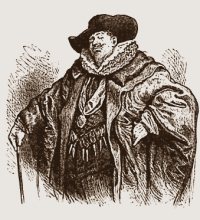"Now as Christian was walking all alone, he noticed someone
else in the distance on his way across the field coming to meet him.
And so it happened that they met just when their paths crossed.
The name of this particular gentleman was Mr. Worldly-Wiseman
who resided in the Town of Carnal-Policy, a very large community
not far removed from Christian’s former home Town. So this man
met Christian and acted as if he knew of his coming beforehand;
the reason was that pilgrims setting out from the City of
Destruction were usually the subject of intense gossip that spread
to many distant towns. Therefore because Mr. Worldly-Wiseman
had some inkling of his coming, he was easily able to observe
Christian’s laborious approach, his sighs and groans and the like,
and thus engage him in sympathetic conversation."
John Bunyan's Pilgrim's Progress
It was interesting to find out that Bunyan had someone specific in mind when he created the character Worldly-Wiseman. Bunyan had been in a doctrinal debate for a few years with Bishop Edward Fowler when he wrote Pilgrim's Progress.
Bishop Edward Fowler wrote 'Design of Christianity' Fowler was a Latitudinarian. A group of 17th-century English theologians who believed in conforming to official Church of England practices and who felt that matters of doctrine, liturgical, and ecclesiastical beliefs were of relatively little importance.
Bunyan described Design as "a mixture of Popery, Socinianism ( denying the divinity of Christ and consequently denying the Trinity) and Quakerism (reasoning, knowledge, intellect).
Bunyan was distressed that Bishop Fowler had been writing about the ability for man to gain salvation by some works. These are quotes from Design of Christianity by Fowler.
"Christ and his apostles have plainly taught that requisites (necessary requirement) to salvation are repentance, faith, and obedience." VII
"If we ask we shall receive. If we seek we shall find. If we knock it shall be opened to us. That is a very great and important work that is set before us to which we are called upon to perform." XXI

Mr Worldly-Wiseman

Bishop Edward Fowler
else in the distance on his way across the field coming to meet him.
And so it happened that they met just when their paths crossed.
The name of this particular gentleman was Mr. Worldly-Wiseman
who resided in the Town of Carnal-Policy, a very large community
not far removed from Christian’s former home Town. So this man
met Christian and acted as if he knew of his coming beforehand;
the reason was that pilgrims setting out from the City of
Destruction were usually the subject of intense gossip that spread
to many distant towns. Therefore because Mr. Worldly-Wiseman
had some inkling of his coming, he was easily able to observe
Christian’s laborious approach, his sighs and groans and the like,
and thus engage him in sympathetic conversation."
John Bunyan's Pilgrim's Progress
It was interesting to find out that Bunyan had someone specific in mind when he created the character Worldly-Wiseman. Bunyan had been in a doctrinal debate for a few years with Bishop Edward Fowler when he wrote Pilgrim's Progress.
Bishop Edward Fowler wrote 'Design of Christianity' Fowler was a Latitudinarian. A group of 17th-century English theologians who believed in conforming to official Church of England practices and who felt that matters of doctrine, liturgical, and ecclesiastical beliefs were of relatively little importance.
Bunyan described Design as "a mixture of Popery, Socinianism ( denying the divinity of Christ and consequently denying the Trinity) and Quakerism (reasoning, knowledge, intellect).
Bunyan was distressed that Bishop Fowler had been writing about the ability for man to gain salvation by some works. These are quotes from Design of Christianity by Fowler.
"Christ and his apostles have plainly taught that requisites (necessary requirement) to salvation are repentance, faith, and obedience." VII
"If we ask we shall receive. If we seek we shall find. If we knock it shall be opened to us. That is a very great and important work that is set before us to which we are called upon to perform." XXI

Mr Worldly-Wiseman

Bishop Edward Fowler
No comments:
Post a Comment